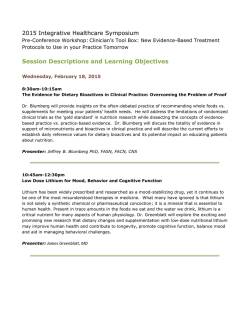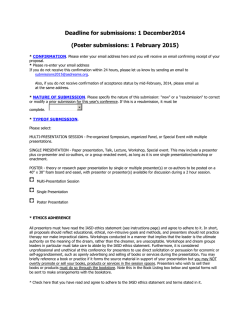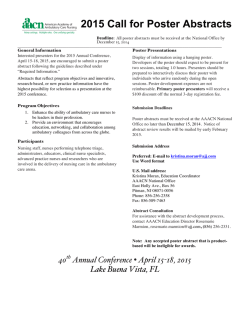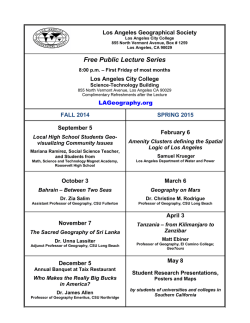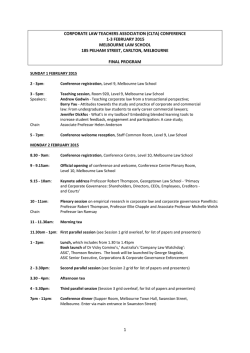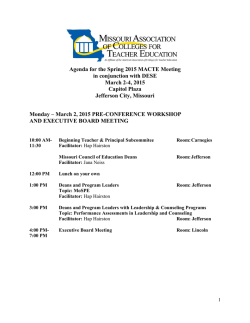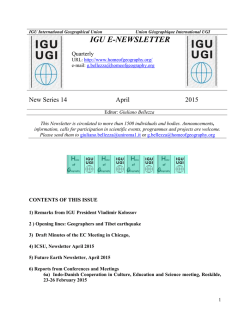
Please click on this link to download a PDF copy of my
Philippe Le Billon Department of Geography & Liu Institute for Global Issues University of British Columbia 1984 West Mall, Vancouver, BC, V6T 1Z2, Canada www.geog.ubc.ca/~lebillon/ Email: [email protected] Phone: 1.604.822.9935, Fax: 1.604.822.6150 Employment History Professor (2013-present, with tenure), Department of Geography and Liu Institute for Global Issues, University of British Columbia, Vancouver – previously Associate Professor (2007-13), and Assistant Professor (2002-2007). Research Associate (2001-2002), International Institute for Strategic Studies, London Research Associate (1999-2001), Overseas Development Institute, London Doctoral Fellow (1999), UN-World Institute for Development Economics Research, Helsinki Field Monitor (1996), United Nations Department of Peace-Keeping Operations (Croatia posting) Humanitarian Attaché (1994-95), French Ministry of Foreign Affairs (Croatia posting) Technical Advisor (1993-94), International Development Research Centre (Cambodia posting) Consultancies, including with ICTJ, IISD, IUCN, DFAIT, DfID, UN-Habitat, CMI-U4, World Bank. ` Education Oxford University, D.Phil. in Geography (1999) Panthéon-Sorbonne, Paris I University, DESS Administration d’Entreprises (M.B.A.) (1990) Angers University, Maîtrise de Sciences et Techniques en Innovation, Biology (M.Sc.) (1989) Brest University, Diplome Universitaire de Technologie, Biology. (1987) Research Output: Summary I have authored/coauthored 4 books and 56 refereed journal articles and book chapters. In addition I have (co)authored three refereed reports and 14 non-refereed policy reports and conference papers. My h-index is 19 and i10-index 27 for a total of 2096 citations (based on Google Scholar). Books/Monographs Oil. Cambridge: Polity Press, 2013 (Resources Series, with G. Bridge). Wars of Plunder: Conflicts, Profits and the Politics of Resources. London/New York: Hurst/Columbia University Press, 2012. The Geopolitics of ‘Resource Wars’. Resource Dependence, Governance and Violence. London: Frank Cass, 2005 (sole editor). Fuelling War. Natural Resources and Armed Conflicts, Adelphi Paper 373. London: Routledge, 2005. Journal articles (refereed) (graduate student names underlined) Gong, Q. and P. Le Billon (in press) “Feeding (On) Geopolitical Anxieties: Asian Appetites, News Media Framing and the 2007-8 Food Crisis”. Geopolitics. Sommerville, M., J. Essex and P. Le Billon (in press) “The ‘Global Food Crisis’ and the Geopolitics of Food Security”, Geopolitics. Elder, S., Zerriffi, H. and P. Le Billon (2013) “Is Fairtrade certification greening agricultural practices? An analysis of Fairtrade environmental standards in Rwanda” Journal of Rural Studies. 32: 264-274. Le Billon, P. and R. Vandecasteyen, (2013) “Pipeline politics and environmental governance: (dis)connecting Alberta’s Tar Sands and BC’s North Coast”, Studies in Political Economy 91: 35-57. Elder, S., H. Zerriffi and P. Le Billon (2012) “Effects of Fair Trade certification on social capital: The case of Rwandan coffee producers”, World Development 40(11): 2355-2367. Baird, I. and P. Le Billon (2012) “Landscapes of political memories: War legacies and land negotiations in Laos”, Political Geography 31(5): 290-300. Le Billon, P. (2010) “Oil and armed conflicts in Africa”, African Geographical Review. 29(1): 63-90. Le Billon, P. (2009) “Natural resource types and conflict termination initiatives”. Colombia Internacional. 70: 9-34. Le Billon, P. and E. Levin (2009) “Building peace with conflict diamonds? Merging security and development in Sierra Leone’s diamond sector”. Development and Change. 40(4): 693-715. Le Billon, P. and A. Cervantes (2009) “Oil prices, scarcity and geographies of war”, Annals of the Association of American Geographers. 99(5): 836-844 (reprinted in Kobayashi, A. ed. (2012) Geographies of Peace and Armed Conflict London: Routledge). Spiegel, S.J. and P. Le Billon (2009) “China’s weapons trade: from ships of shame to the ethics of global resistance”, International Affairs. 85(2): 323-346. Le Billon, P., A. Vines and A. Malaquias (2008) “ Angola’s petro-militarism and external relations », Politique Africaine. 110: 102-121. Le Billon, P. (2008) “Corrupting peace? Corruption, peacebuilding and reconstruction”, International Peacekeeping. 15(3): 344-361. (reprinted in Cheng, C. and D. Zaum eds. (2012) Corruption and Postconflict peacebuilding: Selling the peace? London: Routledge). Le Billon, P. (2008) “Diamond Wars? Conflict Diamonds and Geographies of Resource Wars”, Annals of the Association of American Geographers, 98(2): 345-372. Le Billon, P. and E. Nicholls (2007) “Ending ‘Resource Wars’: Revenue Sharing, Economic Sanction, or Military Intervention?” International Peacekeeping, 14(5): 613-632. Serfati, C. and P. Le Billon (2007) “Guerres pour les ressources: une face visible de la mondialisation”, Ecologie et Politique, 34: 11-31. 2 Le Billon, P. and C. Hocquard (2007) “Filières industrielles et conflits armés: le cas du tantale dans la région des Grands Lacs”, Ecologie et Politique, 34: 83-92. Le Billon, P. and A. Waizenegger (2007) “Peace in the wake of disaster? Secessionist conflicts and the 2004 Indian Ocean tsunami”. Transactions of the Institute of British Geographers. 32: 411-427. Le Billon, P. (2007) “Securing transparency: Armed conflicts and the management of natural resource revenues”, International Journal. Winter 2006/7: 93-107. Le Billon, P. (2007) “Geographies of War: Perspectives on ‘Resource Wars’’”. Compass 1(1): 1-20. Le Billon, P. (2006) “Fatal Transactions: conflict diamonds and the (anti)terrorist consumer”, Antipode 38(4): 778-801. (reprinted in Gregory, D. and A. Pred (2006) Violent Geographies: Fear, Terror, and Political Violence. New York: Routledge). Le Billon, P. (2005) “Corruption, reconstruction and oil governance in Iraq”, Third World Quarterly 26(4): 679-698. Addison, T., A. Geda, P. Le Billon and S.M. Murshed (2005) “Reconstructing and reforming the financial system in conflict and ‘post-conflict’ economies”, Journal of Development Studies 41(4): 704-720. Le Billon, P. (2005) “Aid in the midst of plenty: oil wealth, misery, and advocacy in Angola”, Disasters 29(1): 1-25. Le Billon, P. (2004) “The geopolitical economy of ‘resource wars’”, Geopolitics 9(1): 1-28. (reprinted in Gregory, D. and N. Castree ed. (2012) Human Geography. Ashgate). Le Billon, P. and F. El Khatib (2004) “From free oil to ‘freedom oil’: terrorism, war and US geopolitics in the Persian Gulf”, Geopolitics 9(1): 109-137. Le Billon, P. (2003) “Matières premières, violences et conflits armés”, Tiers Monde XLIV (174): 297321. Le Billon, P. (2003) “Buying peace or fuelling war: the role of corruption in armed conflicts”, Journal of International Development 15 (4), 413-26. Le Billon, P. (2003) “The political ecology of war and resource exploitation”, Studies in Political Economy 70, 59-95. Addison, T., P. Le Billon and M. Murshed (2003) “Conflict in Africa: the cost of peaceful behavior”, Journal of African Economies 11(3), 365-86. Le Billon, P. (2002) “Logging in muddy waters: the politics of forest exploitation in Cambodia”, Critical Asian Studies 34(4), 563-586. (reprinted in Kiernan, B. and C. Hughes (2007) Conflict and Change in Cambodia. London: Routledge, pp. 69-92). Le Billon, P. (2001) “The political `ecology of war: natural resources and armed conflicts”, Political Geography 20(5), 561-584. (selected as one of fifteen articles for 30th Anniversary of the journal in 2012). Le Billon, P. (2001) “Angola’s political economy of war: the role of oil and diamonds 1975-2000”, African Affairs 100, 55-80. Addison, T., P. Le Billon and M. Murshed (2001) “Finance in conflict and reconstruction”, Journal of International Development 13, 951-64. 3 Le Billon, P. (2000) “The political ecology of transition in Cambodia 1989-1999: war, peace and forest exploitation”, Development and Change 31(4), 785-805. Book chapters Le Billon, P. and A. Carter (2012) ‘Dirty Security? Tar Sands, Energy Security and Environmental Violence’, in Natural Resources and Social Conflict: Towards Critical Environmental Security, Matthew A. Schnurr and Larry A. Swatuk (eds.), Ashgate. P. Le Billon (2011) “Contract Renegotiation and Asset Recovery in Post-Conflict Settings”. High Value Natural Resources and Armed Conflicts, edited by Paivi Lujala and Siri Rustad. London: Routledge (in collaboration with UNEP). P. Le Billon (2011) “Bankrupting Peace Spoilers: Can Peacekeepers Curtail Belligerents’ Access to Resource Revenues?”. High Value Natural Resources and Armed Conflicts, edited by Paivi Lujala and Siri Rustad. London: Routledge (in collaboration with UNEP). Rustad, S., P. Lujala and P. Le Billon (2011) “Buying or Spoiling the Peace: Management of High Value Natural Resources in Peacebuilding Processes”. High Value Natural Resources and Armed Conflicts, edited by Paivi Lujala and Siri Rustad. London: Routledge (in collaboration with UNEP). Lujala, P., S. Rustad and P. Le Billon (2010) Valuable Natural Resources in Conflict-Affected States. Ending Wars, Consolidating Peace: Economic Perspectives, edited by Matts Berdal and Achim Weinmann. Adelphi Series 50, 412-13 Harwell, Emily E. and Philippe Le Billon (2009): “Natural Connections: Linking Transitional Justice and Development Through a Focus on Natural Resources”. Transitional Justice and Development, edited by Pablo De Greiff and Roger Duthie. New York: International Center for Transitional Justice, pp. 282-330. Le Billon, P. (2008) “Economic Causes of Conflicts”, Sage Handbook of Conflict Resolution, edited by Jacob Bercovitch, Victor Kremenyuk, and I William Zartman. Ng, P. and P. Le Billon (2007) “'Post-conflict' oil governance: Lessons from Angola?”, Oil Development in Africa: Lessons for Sudan after the Comprehensive Peace Agreement, edited by Luke Patey. Copenhagen: DIIS. Auty, R. and P. Le Billon (2007) “Managing Revenues from Natural Resources and Aid”, in O. Brown (ed) Trade, Aid and Security. London: Earthscan, pp. 158-189. Le Billon, P. and S. Springer (2007) “Between War and Peace: Violence and Accommodation in the Cambodian Logging Sector”, in Wil de Jong, ed, Extreme Conflict and Tropical Forests. New York: Springer. Le Billon, P. (2005) “Resource Wealth and Angola’s Uncivil Wars”, in Cynthia J. Arnson and I. William Zartman Rethinking the Economics of War. The Intersection of Need, Creed, and Greed. Baltimore: Johns Hopkins University Press and Woodrow Wilson Center Press, pp. 107-139. Le Billon, P. (2005) “The Geography of ‘Resource Wars’”, in Colin Flint (ed.) The Geography of War and Peace. Oxford: Oxford University Press, pp. 217-241. Le Billon, P. (2003) “Getting It Done: Instruments of Enforcement”, in Ian Bannon and Paul Collier (eds) Natural Resources and Violent Conflict. Washington DC: World Bank, pp. 215-86. 4 Le Billon, P. (2003) “Natürliche Ressourcen und die politische Ökonomie des Krieges“, in Werner Ruf (ed.) Politische Ökonomie der Gewalt. Staatszerfall und Privatisierung von Gewalt und Krieg. Leverkusen: Leske und Budrich. Le Billon, P. (2000) “The oil industry and the state of war in Angola”, in Bergesen, H.O., A Edide, and P.R. Goyer (eds) Human rights and the oil industry. Antwerp: Intersentia, pp. 115-138. Le Billon, P. & Bakker K. (2000) “Cambodia: genocide, autocracy, and the overpoliticised state”, in Nafziger, E.W., F. Stewart, and R. Vayrinen (eds) War, hunger, and displacement: the origins of humanitarian emergencies. Oxford: Oxford University Press. Volume 2, pp. 53-88. Le Billon, P. (2000) “The dynamics of resource wars”, in Cilliers, J. and C. Dietrich (eds) Angola’s war economy: the role of oil and diamonds. Johannesburg: Institute for Strategic Studies, pp. 21-42. Policy papers (selected) Le Billon, P. (2012) Peace matters: transforming resource exploitation in Liberia and Sierra Leone. Accord, 23: 2734-38. (refereed) Le Billon, P. (2011) Extractive sectors and illicit financial flows: What role for revenue governance initiatives? Bergen: Chr. Michelsen Institute (U4 Issue 2011:13) 41 p. (refereed) Le Billon, P. (2009) Land and high value natural resources in ‘post-conflict’ contexts. Nairobi, UNHabitat. Le Billon, P. (2008) Resources for Peace? Managing Revenues from Extractive Industries in PostConflict Environments. Public Finance in Post-Conflict Environments series, February. Center on International Cooperations, New York University and Political Economy Research Institute, University of Massachusetts. Le Billon, P. (2004) Conflict Diamonds: Taking Stock, Looking Ahead. Report for the Department of Foreign Affairs and International Trade. Vancouver: Liu Institute for Global Issues. Hoskins, C., S. Sharma, and P. Le Billon (2004) The 3D Approach: Building Coherence and Synergies between Defence, Diplomacy and Development initiatives in ‘Fragile States’. Report for the Canadian International Development Agency, Vancouver: Liu Institute for Global Issues. Le Billon, P., J. Sherman, and M. Hartwell (2002) Controlling illicit resources flows to civil wars: a review and analysis of current policies and legal instruments. New York: International Peace Academy. Le Billon, P. (2000) The political economy of war: what relief agencies need to know. Humanitarian Practice Network paper No. 33. London: ODI. Teaching and graduate supervision Undergraduate lecture courses: Geographies of Africa; Geopolitics; Introduction to Political Geography. Graduate seminar courses: Environmental Sustainability; Environment, Development and Security; Human Geography Graduate Seminar. 5 Graduate supervision: PhD thesis supervision: Guillaume Peterson St-Laurent, Mining-related conflicts and indigenous communities in Central America, 2013 – ongoing; SSHRC-funded. Elaine Hsiao, Transborder peace parks in conflict-affected countries, 2011 – on-going; UBC-Law funded; Melanie Sommerville, Agro-investments and historically marginalized indigenous populations in Canada and South Africa, 2010 – on going – SSHRC and IDRC funded; Dawn Hoogeveen, Extractive industries and North-South relations, 2008 - on-going (with J. Sundberg); Simon Springer, Post-conflict violence and neoliberalism, 2005-9 (with J. Peck) – SSHRC funded. Assistant Professor, Geography, National University of Singapore, then Otago and Victoria. Ian Baird, Ethnic minorities and spatiality of colonialisms, 2003-8 – SSHRC funded. Assistant Professor, Geography, University of Wisconsin-Madison. MA thesis supervision: Kelly Sharp, Community-Based Forest Management in Malawi, 2013- (with H. Zerriffi) Sara Helder, Fair trade coffee and producer health, 2008-2011 (with H. Zerriffi) Sara Panofski, Indigenous epistemologies and the Northern Gateway Pipeline, 2008-2010 Jessica Lehman, Sri Lanka ‘post-tsunami’, 2008-2010 (with J. Sundberg) Samuel Spiegel, Political ecology of artisanal gold mining, 2006-2008 (with M. Veiga) – Trudeau Fellowship Arno Waizenegger, Natural disasters and conflict termination – Aceh, exchange student from U. Cologne, completed 2008 (with F. Kraas) Estelle Levine, Diamond sector reforms in Sierra Leone, 2002-2005 (with J. Robinson) Commonweath Scholarship funded. Grants, awards, fellowships Canadian International Development Agency (CIDA), Canadian International Institute for Extractive Industries and Development, 2013-2018, $25 million (co-PI). Social Sciences and Humanities Research Council (SSHRC), Natural resource governance, 2010, $93,000. Killam Research Fellowship, Study leave award, 2008, $18,000. 6 HSS/College for Interdisciplinary Studies Research Grant, Crises and commodities, 2008, $6,850. International Center for Transitional Justice (ICTJ), Transnational justice and development, 2008, $5,000. Center for International Cooperation, Resource sectors and post-conflict public finances, 2007, $5,000. Hampton Research Grant, Post-conflict violence survey of 1200 households in Cambodia, 2006, $20,000. HSS/Hampton Large Research Grant, Post-tsunami conflict resolution in Aceh, 2006, $6,600. International Institute for Sustainable Development (IISD) and International Union for the Conservation of Nature (IUCN), Aid and resource revenue management, 2005, $20,000. Peter Wall Institute for Advanced Studies (PWIAS) Early Career Scholar, Award, 2004, $6,500. Social Sciences and Humanities Research Council (SSHRC), Natural resources and armed conflicts, 2004, $89,550. Canadian International Development Agency (CIDA), Defense, diplomacy and development, 2003, $6,800. HSS New faculty, 2003, $1,833. World Bank, Regulation of resource-based war economies, 2002, $23,000. International Institute for Strategic Studies and Ford Foundation, Natural resources and armed conflicts, 2001, $39,600. Economic and Social Research/Department for International Development, Regulating businesses during armed conflicts, 2000, $28,800. UNU/WIDER Doctoral fellowship, 1999. Green College, Oxford, Graduate Student Award, 1996. Service and memberships Reviewer 35 different journals, including: American Political Science Review (2007; 2008; 2009), World Politics (2005), Journal of Conflict Resolution (2008), Civil Wars (2008), World Development (2006), Journal of Peace Research (2003, 2006, 2007, 2008), Conflict Management and Peace Science (20012), Review of International Political Economy (2006), Studies in Political Economy (2005), African Affairs (2004), Peace and Change (2004), Journal of Conflict, Security and Development (2002), Annals of the AAG (2008, 2009); Progess in Human Geography (2012); Antipode (2010); Transactions (2002, 2007), Economic Geography (2007), Geojournal (2005), Geoforum (2004, 2007), Geopolitics (2004, 2006), Environment and Planning D (2004), Environment and Planning A (2003), Political Geography (2002, 2003, 2004, 2007, 2009), Professional Geographer (2007), Progress in Human Geography (2012). External reviewer/examiner: 7 Organizations: Département de Géographie, Université de Montréal – External reviewer of Departmental Programs (2012) Presses: Polity Press (2008), Hurst/Columbia UP (2010), Palgrave (2012), Cornell UP (2013) Project proposals: Canadian Research Council (SSHRC, 2005-2012; incl. Federal examiner for Postdoctoral grants in 2010); United Nations (2008); Israel Science Foundation (2005); Norwegian Research Council (2012), Swiss National Science Foundation (2012). Graduate theses: Oxford University; LSE; National University of Singapore; Simon Fraser University. Media outlets: Le Billon, P. (2012) interview on situation in DRC, Radio Canada, November 2012. Le Billon, P. (2007) “Debating Iraq’s winners”, Foreign Policy, May/June 2007. Le Billon, P. (2005) “Vers une gestion responsable des ressources énergétiques”, Le Devoir, 24 September 2005. Op-ed. Le Billon, P. (2004) “Head Scarves, Yes”, Globe and Mail, 2 September 2004. Op-ed. Work cited in Christian Science Monitor (2004, 2005, 2012), Globe and Mail (2003), Georgia Straight (2007). Service at the University of British Columbia African Studies Minor, founding committee member (since 2005, coordinator in 2007/8). Research Ethics Board, member (since 2012). International Reporting Program, member UBC (since 2009). International Relations Program Coordinating Committee, member (since 2004). Faculty associate of the Institute for Resources Environment and Sustainability (since 2005). Faculty associate of the Peter Wall Institute for Advanced Studies (since 2004). Promotion and Tenure joint committee IAR/Liu Institute, member (2007). Colloquium committee of the Department of Geography, co-chair (2005/6, 2006/7). Search committees for three Chairs, Liu Institute, member (2005, 2006 & 2012). Executive council of Canadian Consortium on Human Security, member Liu Institute (2005). Liu Institute teaching committee and coordinator MA Program in Global Policy proposal (since 2003). Olav Slaymaker Scholarship in Environment, Liu Institute, selection committee (since 2004). Other Association of American Geographers, member since 2005. Political Geography Study Group of the Association of American Geographers, member since 2005. 8 Africa Study Group of the Association of American Geographers, member since 2006. Africa Awareness, UBC, board member since 2005. Editorial Board of Political Geography, member (2006-2011). Guest co-editor of special issue of Ecologie et Politique (2007). Guest editor of a special issue of Geopolitics (Winter 2003/4). Conference participation 2012 (a) Association of American Geographers, February, New York, (panel presenter and discussant). (b) UNEP Conference on Post-Conflict Peacebuilding and Natural Resource Management, April, Columbia University (presenter). (c) Colloquium on Land Grabbing, June, Institute for Social Studies (presenter). 2011 (a) ‘The Food Crisis and the Geopolitics of the ‘Food Crisis’, AAG, April, Seattle (co-organizer, chair and discussant). (b) ‘Transparency and governmentality’, International Conference of Critical Geography, Frankfurt, 19 August (presenter). (c) ‘Extractive industries’, The Role and Responsibilities of Companies in Conflict Situations: Advancing the Research Agenda, ICIP, Barcelona, 20-21st October (presenter). 2010 (a) ‘‘Environmental violence and conflict’, University of Dalhousie, Halifax, 12 February (presenter). (b) “Securing the tar sands: Western Canada, energy supply and ‘ecoterrorism’, Annual Meeting of the AAG, Washington, DC, 15 April (presenter). 2009 (a) ‘Oil and conflicts in Africa: Historical trends and current debates’, SAIS, Johns Hopkins University, Washington, DC, 2-3 April (presenter). (b) ‘Natural resources and conflict termination’, Universidad de Los Andes, Bogota, 24 April (presenter). 2008 (a) ‘La quête des ressources naturelles en Afrique Centrale: le cas de la République Démocratique du Congo’, Musée Royal d’Afrique Centrale, Tervuren, 8-9 December 2008 (presenter). (b) ‘Les conflits armés en Afrique: approaches locales, contexte global’, Centre d’études d’Afrique Noire/Institut d’études politiques, Bordeaux, 9-11 October 2008 (presenter). 2007 (a) ‘Justice and Power in Shaping Vulnerability and Response to Disaster’, AAG annual conference, San Francisco, April 2007 (co-organizer and chair). (b) ‘Resources, Identities, and Territorialization: Kirkuk's Oil Fields and the Kurdish Question in Iraq’, AAG annual conference, San Francisco, April 2007 (presenter). 9 (c) (d) (e) 2006 (a) 2005 (a) (b) (c) (d) 2004 (a) (b) (c) 2003 (a) (b) (c) (d) (e) (f) 2002 (a) ‘War, Insurgency and Governing Resource Landscapes in Southeast Asia’, AAG annual conference, San Francisco, April 2007 (discussant). ‘Geographies of militarism II’, AAG annual conference, San Francisco, April 2007 (panel presenter). ‘Scholar-Citizens: Different Approaches to Being a Committed Scholar and an Engaged Citizen’, AAG annual conference, San Francisco, April 2007 (panel presenter). ‘Civil Wars and resources in Africa’, Canadian Institute for International Affairs, Vancouver, March 2006 (presenter). ‘Resource governance and armed conflicts’, Université du Québec à Montréal, September 2005 (Presenter). ‘Iraq’s Oil Wealth’, London School of Economics and Open Society Institute, London, June 2005 (Presenter). ‘Resources, violence, and the ‘new geography of war’: the case of petro-imperialism’, Canadian Association of Geographers, 2005 Congress of the Humanities and Social Sciences, London Ont., June 2005 (Presenter). ‘Consumption and petro-imperialism in the landscape of terror’, Association of American Geographers, Denver, May 2005 (Presenter). International Studies Association, Montreal, March 2004 (Presenter). Human Security Conference, UBC, Vancouver, March 2004 (Session Chair). ‘Conflict Diamonds: Taking Stock, Looking Ahead’, Department of Foreign Affairs and International Trade, January 2004 (Organizer and Chair). ‘War Economies and Corporate Responsibilities’, 7th Annual Peacebuilding and Human Security Consultations, Department of Foreign Affairs and International Trade, October 2003 (Presenter). ‘Natural Resources and Armed Conflicts’, McGill University, Montreal, September 2003 (Presenter). ‘Obstacles to Robust Negotiated Conflict Settlement’, Santa Fe Institute and Javeriana University, Bogota, May 2003 (Presenter). Annual Conference of the Association of American Geographers, presentation of one paper (‘blood diamonds: linking spaces of exploitation and regulation’) and participation to two panels (‘political ecology in Asia’; ‘environmental violence’), New Orleans, March 2003. ‘Research Without(Southern) Borders: The Internationalisation of Canadian Research and the Global South’, UBC/SFU/IDRC, Vancouver, February 2003 (Co-organizer). ‘Regulating Private Sector Activity in Zones of Conflict: A Dialogue on Canadian and International Responses’, CPCC/CCHS/IDRC, Ottawa, January 2003 (Presenter). ‘Oil and Conflict’, Bellagio Study and Conference Center, Bellagio, November 2002 (Presenter). 10 (b) (c) (d) 2001 (a) (b) (c) (d) (e) 2000 (a) (b) 1999 (a) 1998 (a) 1997 (a) ‘West African capacity for conflict resolution: a response to NePAD’, ASDR/University of Ghana, Accra, October 2002 (Session Chair and discussant). ‘Northern Markets, Southern Violences: Nature, Resource Flows, and Civil Wars’, Studies in Political Economy conference, Carleton University, Ottawa, February 2002 (Presenter). ‘Wartime transition to post-socialism: the case of natural resources in Angola and Cambodia’, Annual conference of the Institute of British Geographers, Queen’s University, Belfast, January 2002 (Presenter). ‘Natural resources and the political economy of war’, Evangelische Akademie and Medico, Hofgeismar; Center for Development Research, Bonn, Germany, October 2001 (Presenter). ‘Ideological and Resource Conflicts: The Case of Angola’, Woodrow Wilson Center for International Scholars, Washington DC, September 2001 (Presenter). ‘Conflicts and natural resources’, Centre for Defence Studies, King’s College London, June 2001 (Presenter). ‘Economies of conflict: the role of the private sector’, FAFO, Oslo, November 2001 (Discussant). ‘Economics agendas in civil wars’, International Peace Academy, New York, January 2001 (Discussant). ‘The political economy of internal conflicts’, Clingendael Netherlands Institute of International Relations, The Hague, November 2000 (Discussant). ‘The political economy of war’, Overseas Development Institute, London, February 2000 (Coorganiser). ‘Kosovo/Kosova: the NATO bombing campaign and humanitarian emergency’, School of Geography, Oxford, May 1999 (Co-organiser). ‘Economic and social consequences of conflict’, Queen Elizabeth House, University of Oxford, October 1998 (Discussant). ‘Nature, factionalism and political power in Cambodia’, Inaugural International Conference in Critical Geography, University of British Columbia, 1997. Other information Citizenships: French and Canadian (dual). Languages: French and English (fluent), Spanish (intermediate), Khmer (basic). Fieldwork experience: Angola, Bosnia, Cambodia, Colombia, Croatia, Democratic Republic of the Congo, Ghana, Sierra Leone, South Sudan, Thailand, Vietnam. 11
© Copyright 2026
